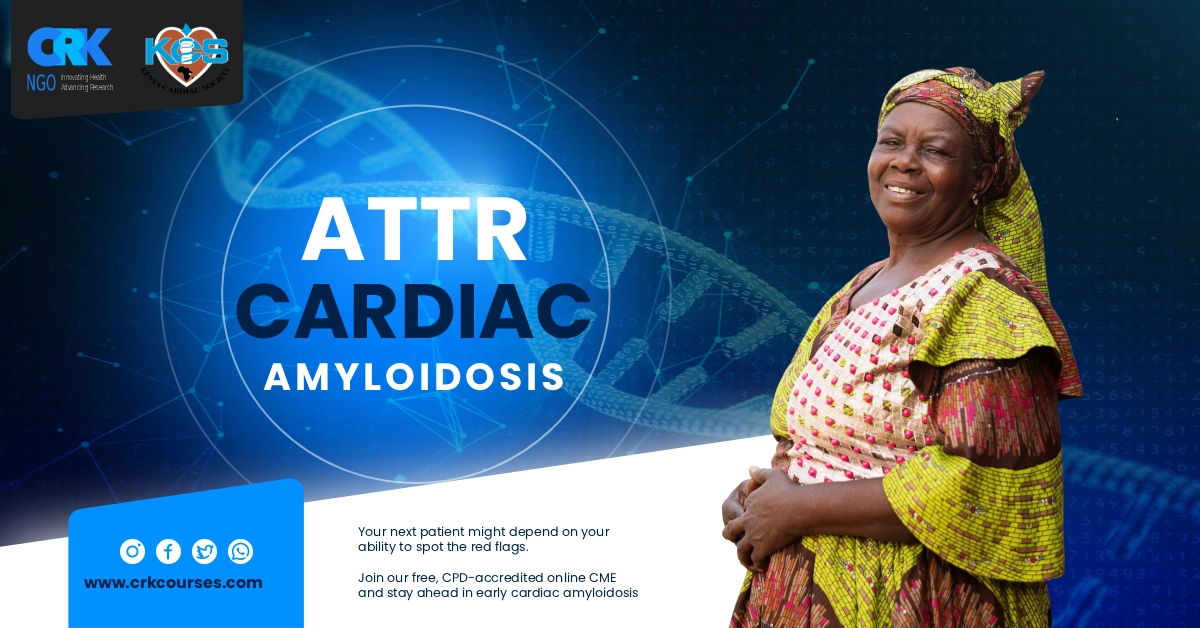ATTR Cardiac Amyloidosis
New Course Launch – “Raising Awareness and Promoting Early Diagnosis of ATTR Cardiac Amyloidosis”:

This educational activity is supported by an independent medical education grant from the Mayo Clinic and Pfizer, Inc.
This CPD-accredited online course is designed to enhance the knowledge, diagnostic accuracy, and clinical response of healthcare professionals in Kenya regarding transthyretin (TTR) cardiac amyloidosis, a serious and underrecognized cause of heart failure. Through an evidence-based and locally contextualized curriculum, the course empowers clinicians to identify red flags, select and interpret appropriate diagnostic tools, and apply best-practice management strategies, including genetic counseling and advanced imaging.
Participants will engage with dynamic learning modules, animated explainer videos, expert interviews, and real-world clinical cases to sharpen diagnostic reasoning and multidisciplinary collaboration. The course also introduces emerging therapies and surveillance strategies tailored to both wild-type and hereditary forms of ATTR-CM.
Whether you’re a cardiologist, internal medicine specialist, radiologist, lab expert, or front-line provider, this course equips you with the tools to ensure earlier diagnosis, improve patient outcomes, and bridge critical gaps in care across Kenya.
For Medical Doctor CPD: icpd kenya
What Will I Learn?
- Describe the pathophysiology, subtypes, and burden of TTR amyloidosis.
- Identify clinical, ECG, and imaging red flags suggestive of ATTR-CM.
- Apply diagnostic algorithms using monoclonal protein screening, bone scintigraphy, biopsy, and genetic testing.
- Interpret cardiac MRI and echocardiographic findings relevant to amyloidosis.
- Choose evidence-based therapies and manage mutation carriers.
- Analyze clinical cases to avoid misdiagnosis and diagnostic delays.
Course Content
ATTR-CM Comprehensive Knowledge Assessment
ATTR-CM Comprehensive Knowledge Assessment (Note: This quiz is for knowledge assessment only; no points will be awarded)
Module 1: Foundations of Transthyretin Amyloidosis
Module 2: Diagnosing ATTR-CM (Introduction and Step 1 – Recognizing Red Flags to Initiate Timely Workup)
Module 3: Confirming the Diagnosis: Step 2 – Monoclonal Protein Screening and Bone Scintigraphy in ATTR-CM
Module 4: Subtype Classification in Cardiac Amyloidosis: Tissue Biopsy, Genetic Testing, and Cardiac MRI (Steps 3 and 4)
Module 5: Steps 5, 6 & 7 – From Risk to Response: Staging, Treatment, and Monitoring in ATTR-CM
Module 6: Beyond the Guidelines: Real-World Cases in ATTR Amyloidosis Diagnosis
ATTR-CM Comprehensive Knowledge Assessment 2
Cardiac Amyloidosis Screening and Management in Patients with Heart Failure: An International African Survey
About the instructors
CRK is Kenyan’s largest and most comprehensive provider of post-graduate training courses in clinical research, public health, pharmaceutical sciences, and various other domains. At CRK-CRO, we believe a properly trained and competent health workforce is essential to any successful healthcare system.
10 Courses
2360 students
Dr. Anders Barasa, MD, PhD is a consultant cardiologist and Head of the Heart Failure Section at Amager & Hvidovre Hospital, University of Copenhagen, Denmark. He earned his PhD in Medical Science from the University of Gothenburg and holds advanced certifications in heart failure from the University of Zurich and the European Society of Cardiology.
With over a decade of clinical and academic experience spanning Europe and Africa, Dr. Barasa has held leadership roles in heart failure programs in Denmark and previously served as Research Lead and Consultant Cardiologist at the Aga Khan University Hospital in Nairobi. His research focuses on heart failure, cardiac imaging, and global cardiology practices, with numerous publications in top-tier journals. He remains deeply engaged in international collaborations to improve cardiovascular care in low- and middle-income countries.
1 Courses
0 students
John Heshmat is a pharmacist and public health professional with over a decade of diverse experience in clinical research, health education, and humanitarian service across Africa. He holds a Master’s in International Public Health from Liverpool John Moores University and a Bachelor of Pharmacy from October 6 University.
As the Clinical Operations Manager at CRK Clinical Research Key (CRO), John leads high-impact clinical research and capacity-building programs targeting underserved populations in Kenya. He also serves as the Country Coordinator for Mécénat Chirurgie Cardiaque, a global organization that sponsors life-saving heart surgeries for children with congenital heart defects.
At CRKCourses.com, John combines scientific rigor with practical field insight to deliver CME/CPD-accredited e-learning programs for healthcare professionals. His teaching emphasizes evidence-based practice, health equity, and the real-world application of research in resource-limited settings.
With a passion for public service and training the next generation of African health leaders, John is committed to improving patient outcomes through education, innovation, and collaborative learning.
4 Courses
8867 students
It was a perfect match.I recommend more of this in different topics and more so in pharmacy practice.
informative and elaborative. clear videos and audio
Thank you very much, I have learnt alot
fantastic
perfect
Yes
Very educative and learned alot
This course has done me a greate deal of knowledge that i can not wait to put into practice
good
highly educative




